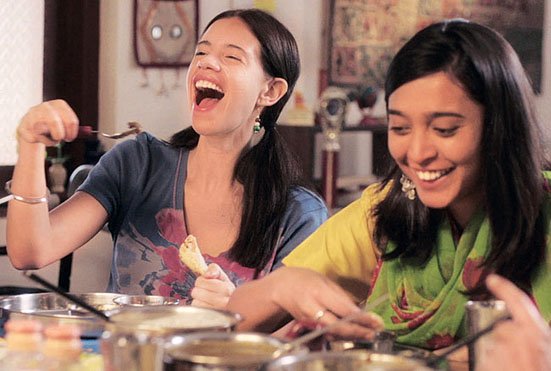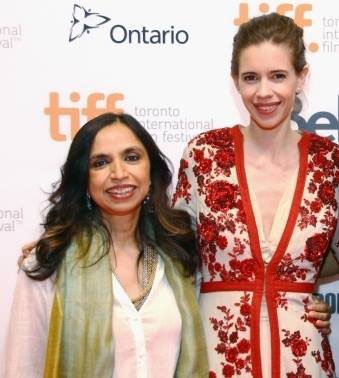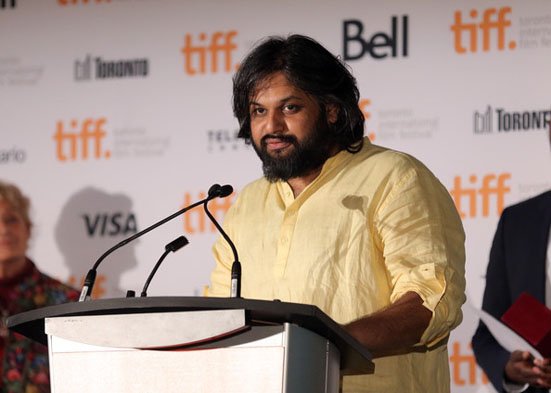
<Swati Sharan>
We take you behind the scenes of Margarita, With A Straw. This 2014 Indian film stars Kalki Koechlin and has won the NETPAC Award at TIFF 2014.
Minority-Review’s Swati Sharan chats with director Shonali Bose, producer/co-director/co-writer Nilesh Maniyar and cinematographer Anne Misawa.

Scene from Margarita, With A Straw starring Kalki Koechlin
To Shonali Bose
How did you conceive the story of Margarita, With A Straw?
Shonali: My sister Malini who has cerebral palsy has inspired it; it’s about really understanding her needs and her yearning to be loved by somebody and to experience sexuality.
I noticed there were subtle movements that the character portrays, which people with physical challenges namely cerebral palsy face. Was that due to your direction or was that Kalki’s interpretation as an actress?
Shonali: I had Kalki closely follow my sister Malini and observe her. And I had grown up with Malini so I knew her inside out. So sometimes on the set, if we were on a wrong note, I knew what to correct because I needed it to be authentic. But I based it on Malini and I knew how every motion and everything should be. Kalki’s work captured that because she observed her so closely.

Director Shonali Bose with Kalki Koechlin at TIFF 2014
In terms of popular Bollywood actresses depicting lesbian relationships, we first had Shabana Azmi and Nandita Das do so in Fire. And then maybe the next time was in 2004 with Isha Kopikkar and Amrita Arora in Girlfriend. And then jump 7 years later still and to a lesser degree, we had a hint of this in Gul Panag’s Turning 30. So probably what we’re noticing since 1997 when Fire first came out is that we’ve seen maybe one lesbian depiction per decade and the reactions seem to be successively less provocative. And when Fire came out, there was a lot of outrage. But in the case of your film, the atmosphere feels more relaxed and unassuming. What do you think changed between 1997 and now?
Shonali: I think the gay rights movement around the world including India is really strong. I think people are opening up and their prejudices are much weaker. But the thing is you see the attack that happened with Fire was not with the audiences. So it’s really important to make that distinction. It was a political party that attacked it and they’d probably attack it now as well. It depends on how the media blows it out of proportion. It gives the impression that India is a backward country and India is opposed to a film like Fire. But those who appreciate Fire will appreciate Margarita. So it’s an important distinction to make. Because you can have an extremist group in any country who are going to attack any film on any subject. So there’s a distinction between a small group and how the rest of the country feels. So that’s the point to keep in mind.
But then do you think there’s a more relaxed attitude towards lesbianism that’s developed at large?
Shonali: Ya, possibly.
To producer/co-director/co-writer Nilesh Maniyar and cinematographer Anne Misawa
How did you two get involved in the making of this film?
Nilesh: I worked with Shonali on the casting of a previous film. We had a lot of creative bonding and I was writing some dialogue for her on the set and then narrating her stories that I wanted to possibly make. That’s when you get to know more about one another’s tastes. Well, that’s how the journey began.

Producer Nilesh Maniyar at the Awards Brunch at TIFF 2014
Anne Misawa: I got a recommendation from a director I worked with before. And I think it was online that we discussed the script. And then I asked Shonali to see Treeless Mountain, which is a film I was the director of photography for and then we Skyped. I was in Hawaii and then I joined them for some location scouting in New York.
Nilesh: So we met for the first time in New York. After seeing Anne’s work in Treeless Mountain and her husband’s work in Jack and Diane, we knew she was the one for us.



0
comments